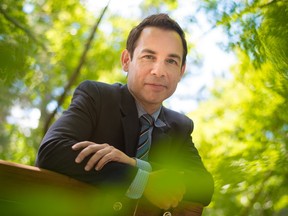Our slimmed-down system has been too small for children’s growing needs for years. The current hospital surge is the reality jolt.

Just over half a century ago, young moms, pediatric experts and Ottawa’s mayor rallied together to say, “We want more for our kids.”
They pushed hard. And, in 1974, CHEO opened its doors. That support — a shared commitment to the best life for our kids — has been the bedrock of CHEO’s unique role in our community. It’s been, and still is, a point of pride.
Sign up to receive daily headline news from Ottawa Citizen, a division of Postmedia Network Inc.
Thanks for signing up!
A welcome email is on its way. If you don't see it, please check your junk folder.
The next issue of Ottawa Citizen Headline News will soon be in your inbox.
But now, almost three years into a pandemic and with unprecedented pressures and volumes mounting each day, it’s time to face a hard truth: What we’ve been doing in kids’ health care — here, across Ontario and across Canada — is just not sustainable. Or enough.
Here’s a quick snapshot of what’s happened at CHEO this past month:
• Our level 2, critical care beds — mostly kids who can’t breathe unassisted — we were at 317 per cent occupancy earlier this month.
• Our level 3 beds — for the very sickest patients — were registering more than 200 per cent capacity.
• Since the beginning of November, the number of kids coming through our emergency department has doubled and so has the number that has needed to be resuscitated.
CHEO is the go-to hospital for kids in eastern and northern Ontario and Nunavut. For much of what we do, we’re the only option. If we can’t care for a child, they must wait. If it’s critically urgent, they may be sent even further from home.
So, Team CHEO did what we do each day. We mobilized. We put all our energy into ensuring safe care for children who need it most urgently. We redeployed our staff and rearranged our space. Even that has not been enough. We’ve had to cancel or postpone surgeries and divert 17- and 18-year-olds to adult hospitals for the first time in our history.
We’ve also asked for extra support from organizations across the region and we have partnered with several, including Roger Neilson House, Ottawa Public Health and local hospitals including The Ottawa Hospital, Pembroke Regional Hospital, Providence Care, Hôpital Montfort, Queensway-Carleton Hospital and Kingston Health Sciences for staff, equipment and accommodating patient transfers.

This week, we’re working with a small team of non-clinical staff from the Red Cross, who will come in to provide support to our clinical teams. Our goal is and will always be about Team CHEO providing the safe, world-class care that our patients deserve.
While these have been unprecedented times, I believe we are facing a crucial moment to decide what is the “right size” of care required to serve the growing and evolving needs of our young community.
In 1974, CHEO opened with 300 beds. Since that time, pediatric medical advances and better public policies have meant kids needed to spend fewer nights in hospital, on average. Successive governments took the wins and reallocated budgets to adult health. The portion of health dollars spent on kids shrank — despite our growing population and despite huge increases in mental health issues, behavioural diagnoses, obesity and other emerging caseloads. In short, we outgrew our kids’ health system.
Today, as a result, there are fewer than half the original number of beds though our population has almost doubled. Before the pandemic, 35 per cent of children waited longer than is clinically safe for surgery and medical imaging. That number rose to more than 50 per cent this past summer. And it will go much higher again after this surge.
Advances in medicine, pharmacology, prenatal care and public health policies over the decades gave successive governments good reasons to find efficiencies and shrink the share of health budgets spent on children’s hospitals, and shift focus and funds to adult systems. Some of that made sense.
Shifting inpatient care to outpatient clinics is better for kids and families. Helmet and seatbelt laws prevented head injuries. Newborn screening caught and prevented rare diseases.
But new needs arose. Depression, anxiety, eating disorders and other mental illnesses have grown sharply in an era of social media and mobile phones. Whole new diseases have emerged, such as H1N1, COVID or now-diagnosable disorders thanks to leading-edge technology.
Ottawa’s child and youth population has grown, most recently nine times more quickly than Ontario’s. Our slimmed-down system has been too small for our children’s growing health needs for years.
The current surge is the reality jolt. Delayed care can have lasting impacts on a child’s entire life trajectory. We have the opportunity and the responsibility to make kids count again.
At CHEO right now, it is all-hands-on-deck as we respond to this never-before-seen level of viral illness among babies and children. We are grateful to the government of Ontario for providing the resources we need to be able to ramp up and open new beds to deal with this pressure.
This surge will ultimately end (sooner rather than later if people follow public health guidance such as masking in crowded indoor spaces and getting vaccinated). We’re already focused on the steep hill we need to climb to tackle backlogs of care that have gotten even longer because of this surge.
Every day matters in the life of a child. Kids should not have to wait longer than adults for surgery, to see a specialist, for therapies to address their physical or developmental disability, to get a diagnostic procedure.
Children are not small adults and they definitely don’t deserve an under-sized health-care system. That was true half a century ago. Our generation’s greatest gift to the future can be to right-size kids’ care, for real.
Alex Munter is the president and CEO of CHEO, the national capital’s pediatric health centre.


